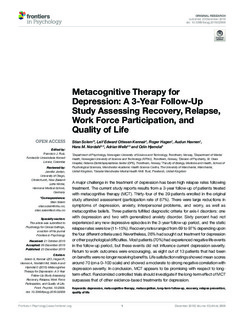| dc.contributor.author | Solem, Stian | |
| dc.contributor.author | Kennair, Leif Edward Ottesen | |
| dc.contributor.author | Hagen, Roger | |
| dc.contributor.author | Havnen, Audun | |
| dc.contributor.author | Nordahl, Hans Morten | |
| dc.contributor.author | Wells, Adrian | |
| dc.contributor.author | Hjemdal, Odin | |
| dc.date.accessioned | 2020-01-03T13:21:33Z | |
| dc.date.available | 2020-01-03T13:21:33Z | |
| dc.date.created | 2020-01-02T09:49:57Z | |
| dc.date.issued | 2019 | |
| dc.identifier.issn | 1664-1078 | |
| dc.identifier.uri | http://hdl.handle.net/11250/2634832 | |
| dc.description.abstract | A major challenge in the treatment of depression has been high relapse rates following treatment. The current study reports results from a 3-year follow-up of patients treated with metacognitive therapy (MCT). Thirty-four of the 39 patients enrolled in the original study attended assessment (participation rate of 87%). There were large reductions in symptoms of depression, anxiety, interpersonal problems, and worry, as well as metacognitive beliefs. Three patients fulfilled diagnostic criteria for axis-I disorders: one with depression and two with generalized anxiety disorder. Sixty percent had not experienced any new depressive episodes in the 3-year follow-up period, and the static relapse rates were low (11–15%). Recovery rates ranged from 69 to 97% depending upon the four different criteria used. Nevertheless, 26% had sought out treatment for depression or other psychological difficulties. Most patients (70%) had experienced negative life events in the follow-up period, but these events did not influence current depression severity. Return to work outcomes were encouraging, as eight out of 13 patients that had been on benefits were no longer receiving benefits. Life satisfaction ratings showed mean scores around 70 (on a 0–100 scale) and showed a moderate to strong negative correlation with depression severity. In conclusion, MCT appears to be promising with respect to long-term effect. Randomized controlled trials should investigate if the long-term effect of MCT surpasses that of other evidence-based treatments for depression. | nb_NO |
| dc.language.iso | eng | nb_NO |
| dc.publisher | Frontiers Media | nb_NO |
| dc.rights | Navngivelse 4.0 Internasjonal | * |
| dc.rights.uri | http://creativecommons.org/licenses/by/4.0/deed.no | * |
| dc.title | Metacognitive Therapy for Depression: A 3-Year Follow-Up Study Assessing Recovery, Relapse, Work Force Participation, and Quality of Life | nb_NO |
| dc.type | Journal article | nb_NO |
| dc.type | Peer reviewed | nb_NO |
| dc.description.version | publishedVersion | nb_NO |
| dc.source.journal | Frontiers in Psychology | nb_NO |
| dc.identifier.doi | https://doi.org/10.3389/fpsyg.2019.02908 | |
| dc.identifier.cristin | 1764911 | |
| dc.description.localcode | © 2019. This article is an open access article distributed under the terms and conditions of the Creative Commons Attribution (CC BY) license (http://creativecommons.org/licenses/by/4.0/). | nb_NO |
| cristin.unitcode | 194,67,40,0 | |
| cristin.unitcode | 1920,25,0,0 | |
| cristin.unitname | Institutt for psykologi | |
| cristin.unitname | PH - Østmarka psykiatriske avdeling | |
| cristin.ispublished | true | |
| cristin.fulltext | original | |
| cristin.qualitycode | 2 | |

